Managing chronic illness during the holidays can be a little overwhelming. While twinkly lights, wrapping gifts and eating all the food may be fun for some, it can be difficult if you live with health conditions. There is disruption to our usual schedules, more social occasions and often a lot of stress too.

I've heard some say that they dread the holidays, and wish it wasn't happening. I can empathise with that for sure. But I hope that we can learn from each other to make this time of year enjoyable - in whatever way works for us. Have a read of the tips below, and see if any would help you!
Jump to:
Learning lessons and scaling back
The first years of having chronic illness conditions, namely migraine, fibromyalgia and dysautonomia (as diagnosed at that time), made actually enjoying the holidays feel very difficult for me. There was so much noise, activity and stress. It was a lot for my body and mind to handle and I felt quite miserable.
Over time I have learnt to scale back during the holidays and not feel a pressure to do all the things I used to. It doesn't matter if there is one less dish on the table, or that I didn't attend every social occasion I am invited to.
I wanted to get the views of others on how to manage chronic illness during the holidays, so I asked on my @through.the.fibro.fog Instagram for people to give their advice on how to navigate the season and the big day. They gave such great advice, so thank you to everyone who sent in their thoughts! Here's what they said:
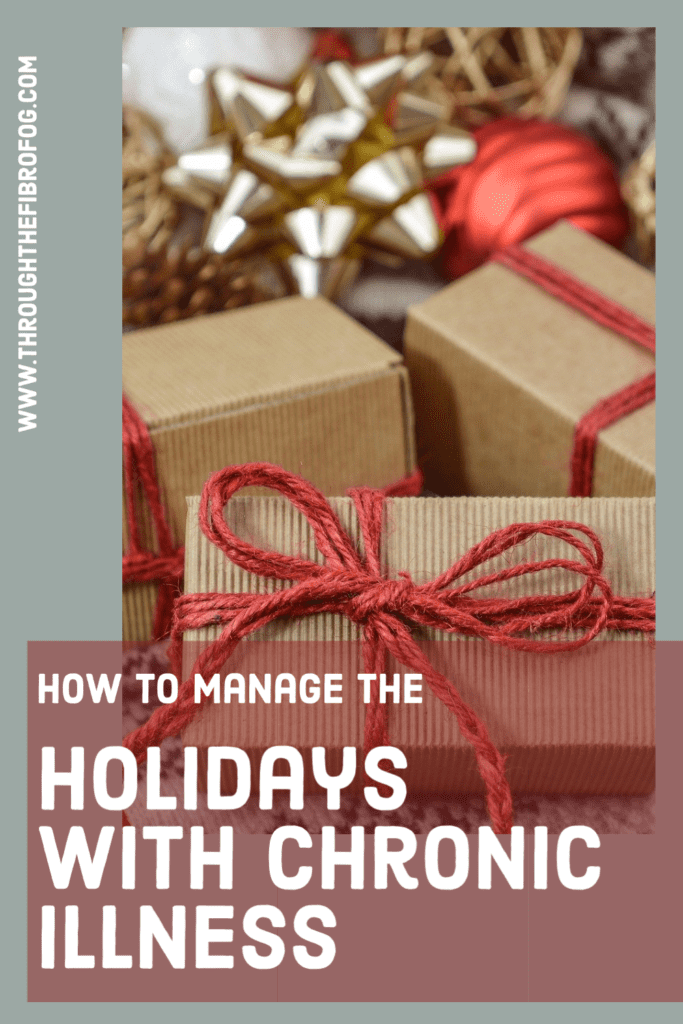
Rest & pacing
Rest and pacing was mentioned as a key way to help manage chronic illness symptoms. It was the aspect of managing chronic illness during the holidays that was mentioned most often, with a focus on looking after ourselves repeated time and time again.
We definitely need to heed this advice! It's so easy to try and push through, but that only affects our health, makes us miserable and makes the holidays something to be apprehensive about rather than enjoy. And there is no point in being utterly exhausted before, during and after the celebrations.
We can incorporate rest in a few ways, and plan it into our days:
Plan rest before, during and after the big day
As my Instagram friends said so many times, rest needs to happen before, during and after the big day. This helps, as one person said, so our 'body is as ready and strong as can be'.
It's so easy though to get caught up in the planning, worrying about writing holiday cards, preparing food and so many other tasks. So I will let you read all the responses that suggest you focus on rest!
- 'Always have a quiet one. Rest before, during and after. Pacing'
- 'Make sure to take time throughout the day to do mini self-care things'
- 'Take time for yourself! If you need to rest, then rest!'
- 'Rest beforehand'
- 'Planned rest slots'
- 'Get enough pre sleep / rest'
- 'Slow down two days before'
- 'Pre planning and pacing (pre planning rest breaks/ rest days especially)
- 'Rest, rest, rest the day before'
Don't push through
I have made this mistake so often. We feel exhausted but try to push through, either out of a sense of obligation or because we want to enjoy time with loved ones. Trouble is, that isn't always enjoyable time if we are exhausted, so much better to rest when required - including on the big day itself.
- 'If you have to rest, rest. Don't push through. You're still with your family lying on the sofa'
- 'Don't put pressure on yourself. Rest if you need to. Your health > family obligations'
Have a designated place to rest
This is so important. It is very easy to say 'go rest' - but where? If you are at home then you can of course retreat to the bedroom for some quiet time, but if you are visiting others then it is best to as them first where you can rest and explain why it is important you have some alone time during the day if you need it.
- 'Have somewhere separate you can go to lie down and rest or sleep when needed'
- 'Find a safe space for the day'
Related post: Pacing with chronic illness (and how I'm choosing to 'spend' my energy)

Setting boundaries
You know your health better than anyone. Don't let others talk you into activities that you aren't comfortable with, or that would be detrimental to your health. It's definitely hard to advocate for yourself at times, but those who love you will want to ensure that you feel as good as you can do.
Setting boundaries is one way to do this. For example, if I am visiting family then I say what time I will arrive (often later than others) and what time I will be leaving. Your needs aren't something to be ashamed of. So make sure you do what is right for you, as you deserve to enjoy the day too.
As my Instagram friends say:
- 'Set healthy boundaries'
- 'Set boundaries with family'
- 'Don't be afraid to state your needs and follow through with them'
- 'Don't be embarrassed to advocate for yourself. Leave or make accommodations without shame'
Inform family of your needs and get help
Related to setting boundaries is having family and friends both understand what you need, and getting them to help out too.
If you are hosting then ask for help and delegate tasks. Get guests to bring a dish each for your meal, or games for the children. Give strict boundaries on 'going home time'. Get someone to walk the dog, do housework beforehand and wrap gifts. It seems as though we all need a little helper, and need to rope in the daughter of the first response here!
- 'I recommend a daughter who likes Xmas if that's an option!'
- 'Delegate the work'
- 'Inform people around you so no expectations'
- 'Start saying in early December to people that Christmas is a really difficult time so they already know'
- 'Rest as needed, and ask those around you which one or two things they see as critical to the day'
- 'Ask for help'
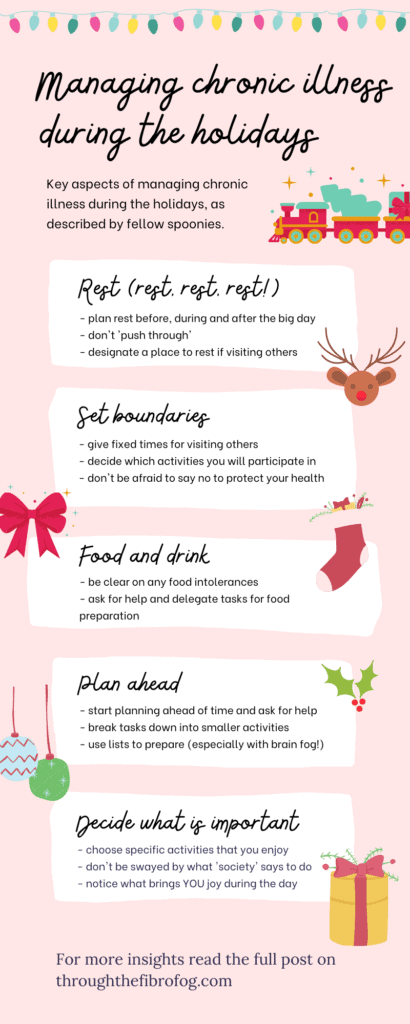
Planning ahead
I think that planning and chronic illness go hand-in-hand don't they? After all, too much energy expenditure all at once is never ideal, nor is feeling rushed or stressed with a huge to-do list and barely any time to actually do it . . .
So start early is the key message from my Insta friends! Begin early, perhaps make lists of tasks ( always easier I find, then we don't forget something when brain fog is high!), delegate tasks and choose what is important:
- 'Start planning early!'
- 'Plan ahead as much as possible. I start in September little by little so it's not as much'
- 'Try to do as much beforehand as far ahead as possible so you have time to enjoy'
- 'Start early and break tasks up into a few minutes'
- Lists, lists, lists, nap, lists' ( I love the nap in the middle of the lists!)
- 'Do as much preparation as you can in the days ahead to make the main event less taxing'
- 'Be prepared and organised'
- 'I start my prep months in advance, decorating, menu planning, choosing recipes etc'

Re-think what is important for your day
This was one of my biggest lessons, and it was said many times by my Instagram friends. There is often pressure to do certain things, and follow a 'schedule' of holiday activities. But you know, those 'perfect' holiday settings likely only take place in the movies. We don't HAVE to eat turkey, go ice-skating (with vestibular migraine I would just fall over . . . ) and go to a dozen parties. None of it is mandatory!
So have a think about what beings you joy and is important to you and your family. A quiet celebration, with a small meal (whether you prepared it or not!) and watching a movie is just as 'celebratory' if that is what makes you smile:
- 'Notice the little things that bring you joy that day'
- 'Pick the things / activities / traditions that matter, focus on those'
- 'Not every part of the routine is "tradition" - you can pick and choose!'
- 'Do it how you need to not how society says you should'
- 'You can't do everything; choose your favs'
- 'Take your time and don't try to prove anything! . . . I need to do this this year'
Don't be hard on yourself
And following on from working out what is important, don't feel bad for doing things a bit differently! It's up to you, and should be guilt free!
- 'Don't feel bad if you have to celebrate on a different day than the "actual" holiday'
- 'Take as many shortcuts as you can. Buy read made stuff, disposable foil pans, guilt free'
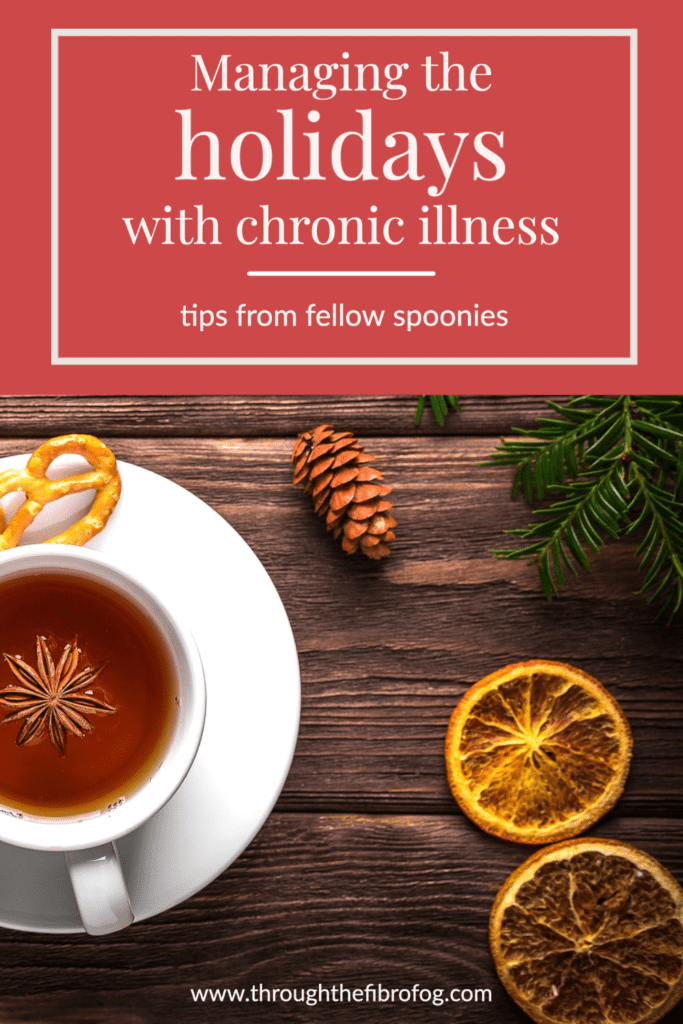
Food and drink
Cooking (and eating!) is a huge part of the holidays, but let's face it, it is time-consuming and very tiring. Your lunch or dinner doesn't have to be a massive banquet though - a simple meal is just as lovely if it is food that you really enjoy.
As my Instagram friends suggest, there are options to make it easier. Delegate tasks, buy pre-made, and get guests to bring a dish or two. My sister always brings dessert for example.
Food can also be a bit tricky if you live with food intolerances or have to follow a particular diet due to your medical conditions, whether it is a low histamine diet, gluten-free or other type. I find it best to talk to guests (or hosts) ahead of time. Have a read of the post linked below for more tips!
- 'Buy pre-made food if you can afford it, pr pre make it, so your energy can go elsewhere'
- 'Non-alcoholic drinks appropriate for the event'
- 'Get someone else to cook'
- 'Make food ahead'
- 'I start my prep months in advance . . . menu planning, choosing recipes etc'
- 'Pack as much of your own food as possible'
It can also be the case that eating well leading up to the holidays can be helpful as it can help us with our health conditions. I try and get lots of vitamins in as a bit of a boost!
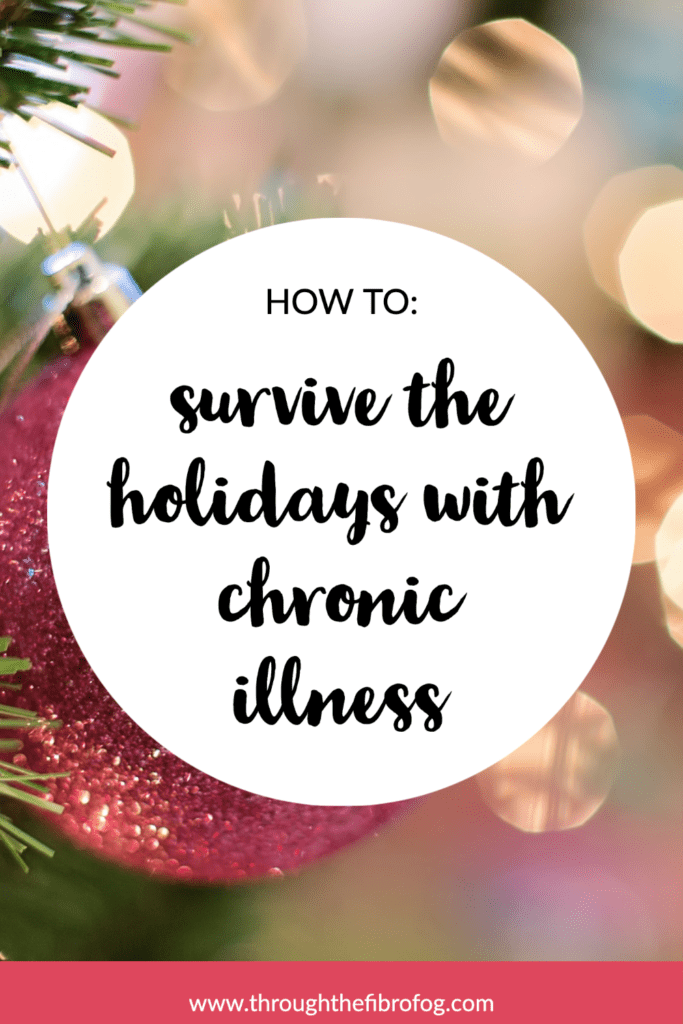
Practical aspects to be comfortable
Comfort, comfort, comfort is the name of the game! It has been years since I did the big day in an uncomfortable tight dress and heels. I still wear a dress, but it is of the comfy variety. And no heels, that's for sure!
Don't forget key items as well. As one person mentioned, if you are heading to a friend or family member's house then don't forget your meds. You may also want to pack pain relief products such as a headache hat if you live with migraine, or nausea relief bands if nausea is an issue for you. Migraine glasses are so helpful if you are watching TV or using screens.
Another idea is a large scarf to double as a blanket for resting in, a big bottle of water and perhaps download some podcasts or audio books if you want some 'me time' to rest in another room.
- 'Comfy clothes'
- 'Make sure you pack all your meds'
Related post: Clothes and chronic illness: comfy styles and symptom management
And one that made me laugh . . .
OK, I think we may all have been here at one time in our lives in thinking this . . .
- 'Stay at home' (with a hands over face and laughing emoji)
All jokes aside though, it is easy to feel pressure to 'do' the holidays in particular ways, and that often means with other people. Yet if that is problematic for your health, then it may be wise to consider down-sizing. Perhaps only seeing a few family members or friends for an hour or two, having a cup of tea and exchanging gifts and a little catch-up. Or perhaps just a short Zoom call instead. Do what you enjoy, and remember that chronic illness during the holidays is tough so be kind to yourself!
Related posts
Best health, wellness and chronic illness products
Come join me on Instagram and Twitter for more helpful posts on living with chronic illness!
Don't forget to pin the post to your holiday boards!
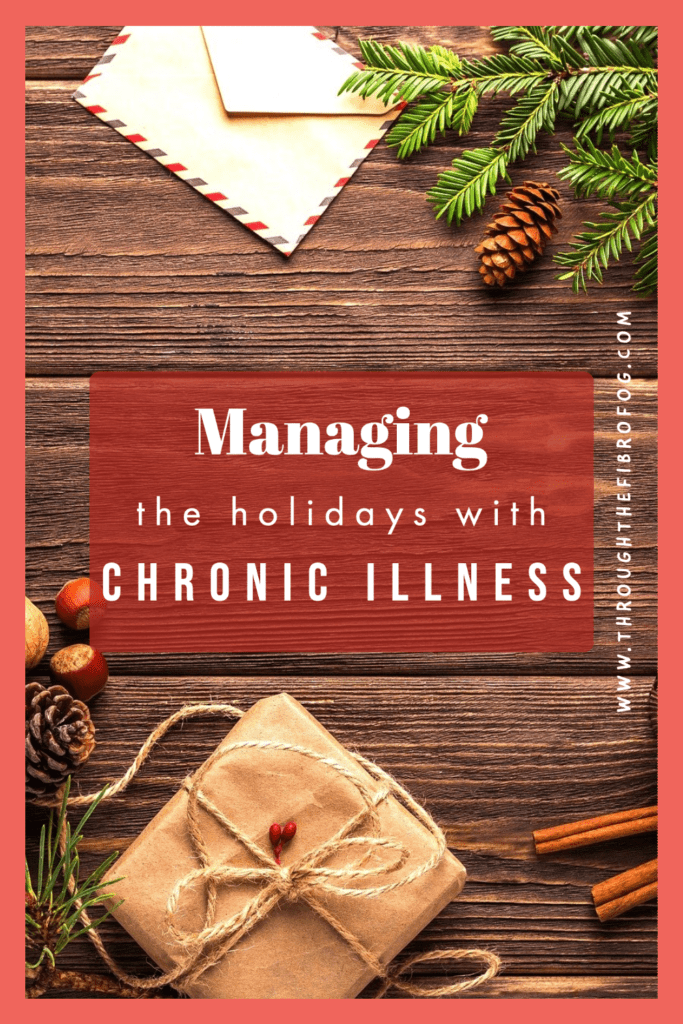















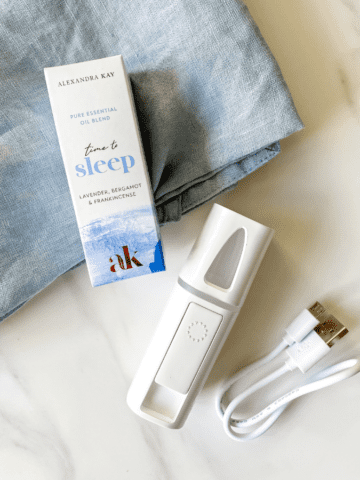

Pam says
I found your blog through a google search for chronic illness warriors for the holidays. I'm working on a post myself for homeschool moms living with chronic illness to survive the holiday season while homeschooling. This post is so great! I plan to link it up on my blog when I do my own post on this subject. Thanks for the great tips. Fellow Fibro Fogger and IC'er here. 🙂
throughthefibrofog says
thanks so much Pam, and hope the tips are helpful! 🙂